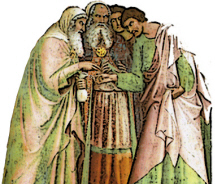|
On The Sin of Judas
What did Judas plan to do with the thirty pieces of silver for which he betrayed Jesus? Think on it. There appear to be only two explanations, although others have been offered in attempts to comprehend the magnitude of Judas’s betrayal, such as greed, power, or political aspirations, but all these pale before a consciousness of the spiritual, ontological, and sheer metaphysical scale of what Judas had one. No other crime in the annals of history, from the first sibilation of the Serpent in the Garden of Paradise, to that last shrieking malediction of Satan when he is hurled into the crescendo of Hell forever at the end of time — neither of these, nor all the unspeakable atrocities in between that have fouled the course of human existence, equals the crime of Judas. Judas sinned against perfect, infinite, divine, Innocence! We do not know that Innocence, although we guess at it, and even glimpse it in the eyes of babies, of children (yes, God is so intent on our glimpsing this, that we even behold its gleam in the eyes of all little and harmless things!) His crime was not just against “innocence,” but against Innocence Himself: Iesus Innocens Patris! The Sinless One! He in virtue of Whom all that possesses innocence is innocent! He against Whom all else are guilty, because none else are perfectly innocent! Spiritually. Morally. Ontologically. Metaphysically! And yet in Whom all guilt is acquitted. He, the Spotless One against Whom all are blemished, and yet in Whom every blemish is removed! Can we begin now to see the enormity of Judas’s sin? His crime against Christ, in Christ is his crime — infinitely less, so infinitely less — nevertheless a crime against us! Against our children. And our children’s children! And yet, so devastating a swath of such incomprehensible malice cannot be of man alone, so utterly malevolent was, is, its issue. No! Whatever Judas planned to do with thirty pieces of silver we can never know. What Satan planned to do with Judas we do know! For such a paltry sum “Satan entered into Judas” (St. Luke 22.3, St. John 13.27) And yet, for the Demon and the man, so poised for so certain a victory, did that bright thunder fall when in their evil mutuality they unwittingly cooperated in the final extinction of evil beginning on the Cross the next day, and culminating at the end of time in the Redemption of the World that the Dragon had long sought to destroy in the raging Lake of Fire awaiting him in the Second Death. (Apoc. 20.9-10) Evil recoiled upon itself this day — and in so doing wrought its own destruction in the Blood of Christ shed for men on the Cross — and in the Cup of Salvation ( “Hic est enim calix sanguinis mei”) from which we will quaff this blessed Easter Sunday!Oh, yes. The two possible explanations: Judas had hoped that, having delivered Jesus to the Sanhedrin, Christ would be given the opportunity to speak without prejudice before the entire council, among whom, he very likely knew, Christ had sympathizers, at least in Nicodemus (St. John 3.4; 7.50-52) and Joseph of Arimathea (St. Luke 23.50-51, St. Matthew 27.57), and so exonerate Himself of their constant accusations. The problem with this explanation is that it attributes to Judas the virtues of both justice and good will, virtues that we do not find predicated of him in Holy Scripture where he is, as we have seen, described as a thief 1 and a devil. 2 The last explanation is that Judas was not responsible at all, for he was possessed by the devil:
This explanation, however, does not explain Judas’s complicity with the Jewish religious leaders much earlier in the account where we find him conspiring to deliver Jesus at the opportune time. This, of course, occurred well before the passage cited immediately above. Judas's betrayal was of his own doing, and for an already determined amount of silver (to what end we can never know). On that unimaginably dark night of darkness, Satan found not just one willing accomplice, did he? He found many! How very many! Even among the highest religious authorities! Just as he still finds among us — from the least to the highest echelons of office! _________________________ 1 (St. John 12.6) 2 (St. John 6.71-72)
Editor March 27, 2024 Comments? Write us: editor@boston-catholic-journal.com
|






















